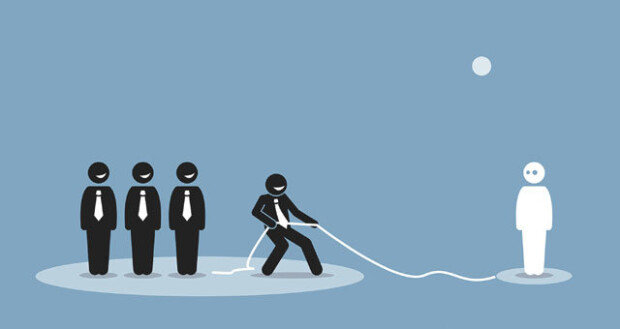The courage needed to persuade leaders
The courage needed to persuade leaders
Posted March. 22, 2021 07:38,
Updated March. 22, 2021 07:38

The legend of Steve Jobs is that he transformed our lives with the strength of his convictions. The key to his greatness, the story goes, was his ability to bend the world to his vision. The reality is that much of Apple’s success came from his team’s pushing him to rethink his positions. If Jobs hadn’t surrounded himself with people who knew how to change his mind, he might not have changed the world.
For years Jobs insisted he would never make a phone. After his team finally persuaded him to reconsider, he banned outside apps; it took another year to get him to reverse that stance. Within nine months the App Store had a billion downloads, and a decade later the iPhone had generated more than $1 trillion in revenue.
The first barrier to changing someone’s view is arrogance. We’ve all encountered leaders who are overconfident: They don’t know what they don’t know. If you call out their ignorance directly, they may get defensive. A better approach is to let them recognize the gaps in their own understanding.
A few years ago I met Wendell Weeks, the CEO of Corning, which makes the glass for the iPhone. That relationship began when Jobs reached out to him, frustrated that the plastic face of the iPhone prototype kept getting scratched. Jobs wanted strong glass to cover the display, but his team at Apple had sampled some of Corning’s glass and found it too fragile. Weeks explained that he could think of three ways to develop something better. “I don’t know that I’d make the glass for you,” he told Jobs, “but I’d be very happy to talk with any members of your team who are technical enough to talk this thing through.” Jobs responded, “I’m technical enough!”
Trying to explain something complex can be a humbling experience—even for someone like Steve Jobs.
When Weeks flew out to Cupertino, Jobs tried to tell him how to make the glass. Instead of arguing, Weeks let him explain the way his preferred method would work. As Jobs started talking, it became clear to both of them that he didn’t fully understand how to design glass that wouldn’t shatter. That was the opening Weeks needed. He walked to a whiteboard and said, “Let me teach you some science, and then we can have a great conversation.” Jobs agreed, and Weeks eventually sketched out the glass composition, complete with molecules and sodium and potassium ion exchanges. They ended up doing it Weeks’s way. The day the iPhone launched, Weeks received a message from Jobs that’s now framed in his office: “We couldn’t have done it without you.”
A second obstacle to changing people’s opinions is stubbornness. Intractable people see consistency and certainty as virtues. Once made up, their minds seem to be set in stone. But their views become more pliable if you hand them a chisel.
Not long ago I was introduced to a former Apple engineer named Mike Bell, who knew how to play catch with Steve Jobs. In the late 1990s Bell was listening to music on his Mac computer and getting annoyed at the thought of lugging the device with him from room to room. When he suggested building a separate box to stream audio, Jobs laughed at him. When Bell recommended streaming video, too, Jobs fired back, “Who the f— would ever want to stream video?”
Bell told me that when evaluating other people’s ideas, Jobs often pushed back to assert his control. But when Jobs was the one generating ideas, he was more open to considering alternatives. Bell learned to plant the seeds of a new concept, hoping that Jobs would warm to it and give it some sunlight.
A third hurdle in the way of changing minds is narcissism. Narcissistic leaders believe they’re superior and special, and they don’t take kindly to being told they’re wrong. But with careful framing, you can coax them toward acknowledging that they’re flawed and fallible.
The key is to praise people in an area different from the one in which you hope to change their minds. If you’re trying to get a narcissistic leader to rethink a bad choice, it’s a mistake to say you admire her decision-making skills; you’re better off commending her creativity. We all have multiple identities, and when we feel secure about one of our strengths, we become more open to accepting our shortcomings elsewhere. Psychologists find that narcissists are less aggressive—and less selfish—after being reminded that they’re athletic or funny.
Organizations need strong, visionary executives like Jobs. But they also need employees like Tony Fadell and Mike Bell, suppliers like Wendell Weeks, and stakeholders like the audience member who stood up to complain at Apple’s developer conference—people who know how to effectively counteract bosses and colleagues who tend toward overconfidence, stubbornness, narcissism, or disagreeableness. In a turbulent world, success depends not just on cognitive horsepower but also on cognitive flexibility. When leaders lack the wisdom to question their convictions, followers need the courage to persuade them to change their minds.
This article is appeared in the March–April 2021 issue of Harvard Business Review, and written by Adam Grant, an organizational psychologist at Wharton School.







